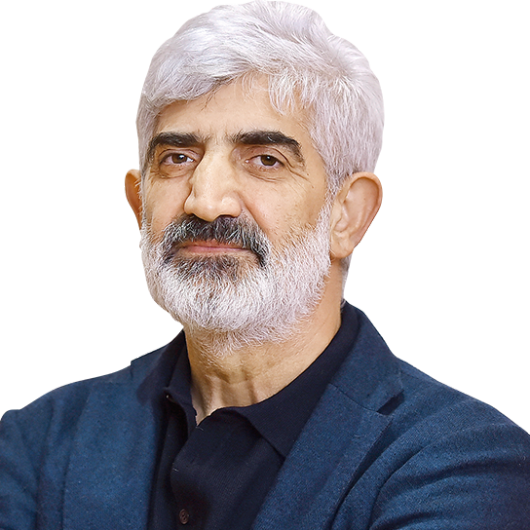
- 26.01.2025, Pazar
- 22:14
Free elections in Karabakh and the meaning of the Turkic States Organization
20:2710/02/2024, Cumartesi
Next article
İhsan Aktaş

After the end of the Cold War, states under the umbrella of Russia's calendar declared their independence one by one. The first place where the fire of independence ignited was Azerbaijan, which declared its independence with great enthusiasm. Not long after the declaration of independence, a war broke out between Armenia and Azerbaijan, and Armenia occupied one-third of Azerbaijani territory. This period of occupation was a great trauma for the Azerbaijani people. Almost a generation experienced
After the end of the Cold War, states under the umbrella of Russia's calendar declared their independence one by one. The first place where the fire of independence ignited was Azerbaijan, which declared its independence with great enthusiasm.
Not long after the declaration of independence, a war broke out between Armenia and Azerbaijan, and Armenia occupied one-third of Azerbaijani territory. This period of occupation was a great trauma for the Azerbaijani people. Almost a generation experienced this trauma day by day. During the years of occupation, Azerbaijani youth mourned.
People who moved from Karabakh to Baku and other cities lived a nomadic life and did not largely settle down in the hope of returning to Karabakh one day.
From the days of occupation until today, Azerbaijan has developed economically and had the opportunity to sell oil and natural gas. While they were making their cities prosperous on one hand, they also strengthened their armies on the other hand. During the recovery process, Azerbaijan had a chance, with the spiritual support of one of the world's most sophisticated and powerful armies, like Türkiye, by its side.
In a way, Azerbaijan was focusing on completing its own development day and night, 24/7, while also aiming to reclaim the lost territories.
When Armenian forces attacked Azerbaijan, Azerbaijan initiated a ground war, which turned into an opportunity for them. Within 40 days, Azerbaijan fought an important front-line battle and regained its territory.
Azerbaijan's reclaiming of its own territory also marked a turning point in the geopolitics of the Caucasus. Throughout history, Turks have established great empires around the world. Especially between the 14th and 16th centuries, more than half of the empires in the world were under Turkish rule.
After the Cold War, Kazakhstan, Uzbekistan, Turkmenistan, Kyrgyzstan, Tajikistan, and Azerbaijan, that is, each of the Turkic states, occasionally came together. They held some meetings mostly consisting of cultural content.
Türkiye was largely in a position where it was not vocally advocating its full independence, largely adhering to the NATO concept. It was also not in a position to help newly emerged states from the Cold War climate. The death of Turgut Özal was an important loss for the Turkic states.
In the past 30 years, there have been significant changes in the world's conjuncture. Especially in the last decade, the AK Party governments have gradually turned Türkiye into a regional power.
Türkiye completed its infrastructure, made significant developments in the defense industry. It created an influence in Syria, Libya. At the same time, with its sophisticated support in the Karabakh War, it played an important role in changing the fate of the war for Azerbaijan.
At this very moment, the Turkish States Organization occasionally held meetings under the leadership of Türkiye. Until now, this community, which has been almost a cultural union, has also turned into a community with strategic depth and meaning integrity.
The Karabakh War, in a way, reminded the Turkic states that any Turkic state can solve its problems together with its partners. In interstate relations, of course, cultural proximity, language unity, and national unity are important, but the formation of an economic power also contributes to the deepening and meaningfulness of these relations.
One opportunity presented by the Karabakh War to the Turkic states is the direct connection between Türkiye and the Turkic world with the opening of the Zangezur Corridor. The establishment of a land connection and a cultural and geopolitical line stretching from Istanbul to Tashkent is quite valuable.
We went to Baku as observers for the presidential elections in Azerbaijan. On this occasion, we also visited Fuzuli and Shusha, which were liberated from Armenian occupation in Karabakh.
This seems to be due to the culture of Armenian resentment and anger; not a stone was left unturned in the city of Fuzuli. There is hardly a single house with a roof or chimney left.
Some buildings in Shusha have managed to survive.
Azerbaijan has launched an investment mobilization in all the provinces of Karabakh with its strong economic structure; roads, new buildings, and settlements...
Ilham Aliyev, staying overnight in Hankendi, one of the most important cities of Azerbaijan, which was once used as the "capital" by the separatist Armenian administration, and casting his vote there with his family, was a very political and symbolic image. This situation is a sign that Azerbaijan will forever keep the territories it has liberated from occupation in its own hands.
At first glance, the Karabakh War may seem like Azerbaijan's liberation of its own territories from Armenian occupation, but essentially it has empowered the Turkic States Organization and deepened its meaning, integrity, and unity. The 40-day Azerbaijan-Armenia War may shape the thousand-year future of the Turkic world.
#Türkiye
#Azerbaijan
#Elections
#Turkic Nations
LEGAL NOTICE
The BIST name and logo are protected under the "Protected Trademark Certificate" and cannot be used, quoted, or altered without permission.All rights to the information disclosed under the BIST name are entirely owned by BIST and cannot be republished. Market data is provided by iDealdata Financial Technologies Inc. BIST stock data is delayed by 15 minutes.
